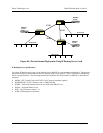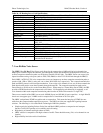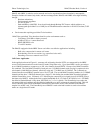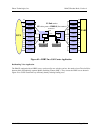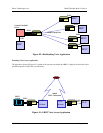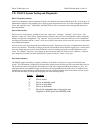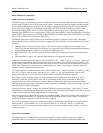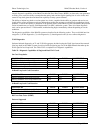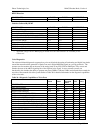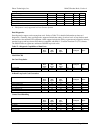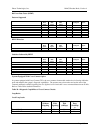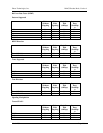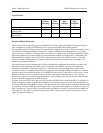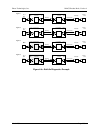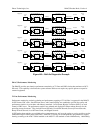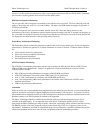
Zhone Technologies, Inc. IMACS Product Book, Version 4
March 2001 Page 110
for each T1 in the system, the operator may select an error rate threshold (from 10E-4 to 10E-9) which, if exceeded,
will cause the system to generate an Excessive Error Rate (EER) alarm.
DDS Line Performance Monitoring
The two-port OCU-DP card supports two methods of non-intrusive error correction. The first is Majority Vote and
applies to lower data rates such as 2.4, 4.8 and 9.6 Kbps. The other is the BCH method and applies to data rates of
19.2 Kbps and 56 Kbps.
If an OCU-DP port has error correction enabled, then the system will collect and display statistics on the
performance of the circuit. Performance statistics include separate incoming (from the T1 network) and outgoing (to
the 4-wire DDS circuit) Errored Seconds, Severely Errored Seconds and Consecutive Severely Errored Seconds and
are displayed in one-hour intervals for the preceding twenty-four hours.
Frame Relay Performance Monitoring
The Frame Relay Server accumulates performance statistics that can be used to monitor port, circuit and congestion
characteristics. Statistics are gathered in 15-minute increments for a total of 24 hours. Collected statistics includes
the:
• Circuit transmit and receive performance
• Circuit user contract compliance information
• Circuit congestion information
• Port transmit and receive information
ATM Performance Monitoring
The ATM Server accumulates performance statistics used to monitor the DS3 physical link, the ATM UNI, and
VBR and CBR circuit characteristics. Statistics are gathered in 15-minute increments for a total of 24 hours.
Collected statistics include:
• DS3 ATM physical link performance in accordance with DS3 MIB specification
• ATM UNI performance in accordance with ATM Forum UNI 3.0 specification
• AAL 3, 4 and 5 performance in accordance with AToM MIB specification
• AAL 1 and corresponding CBR circuit performance in accordance with ATM Forum’s DS1/E1 circuit
emulation specification
• VBR circuit performance characteristics
Conclusion
While the actual costs of telecommunications equipment has been decreasing over time, the cost associated with the
logistical, operational and technical support keeping the network running is still expensive. As a result, it is critical
that communications equipment provides all of the self-diagnostics and test tools needed to troubleshoot and resolve
problems remotely, even if the problems are external to the equipment.
The Zhone Technologies IMACS combines the functionality of the most advanced integrated access device
available on the market today. It is an important asset to the Zhone Technologies product portfolio, which
incorporates the Zhone Technologies stamp of quality, innovation, engineering, quality assurance and HALT testing.
The IMACS provides a full suite of network services such as frame relay, FXO, etc. to support a variety of user
requirements. Furthermore, the IMACS’ unparalleled integral test and diagnostic capabilities eliminate the need for
external test equipment and in most cases, the need to dispatch personnel to troubleshoot problems.



